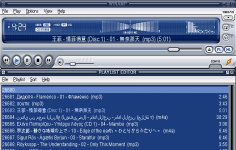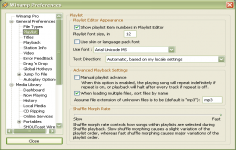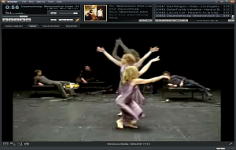 Winamp 5.09 Full
Winamp 5.09 Full
Nullsoft - (Freeware)
The number of formats supported and its versatile and customizable interface made Winamp one of the most popular audio player.
Winamp is a popular software specially designed to play audio files. It is always capable of reading a plurality of audio and video formats. The program can extract and compress the CDs to AAC or WAV.
Winamp has a burning function too, so that user will be able to burn his playlists and create his own compilations.
The appearance of the interface is fully customizable with classic skins or with modern versions. Winamp also allows to discover radio and TV channels broadcast over the Internet through its built-in tuner.
The pioneer mp3 players continues to be of great interest for several reasons. It manages a large number of audio and video formats where most competitors are limited to. Winamp is also much easier to customize, thanks to hundreds of skins, visualizations or various and varied plugins.
The software acquires an Orb based on module to access its library remotely via a secure web page, and includes a browser in line with Songbird, allowing easy access to audio content such as web pages and audioblogs.
Winamp supports a wide range of players , starting with iPods to Creative or Archos players through the UMS readers.
The software offers the possibility to retrieve information about a song or an album cover on the Internet. This feature requires an Internet connection and makes it easy to manage.
Access to online radio is also on the program. Not less than 30,000 radio stations are accessible if the Internet connection allows it. Radios are categorized by genre, this way it is easier to find the one desired to listen .
- Title:
- Winamp 5.09 Full
- File Size:
- 4.6 MB
- Requirements:
- Windows 9x / 2000 / XP / Vista / Windows7 / Windows8
- Language:
- en-us
- License:
- Freeware
- Date Added:
- 03 May 2005
- Publisher:
- Nullsoft
- Homepage:
- http://www.nullsoft.com
- MD5 Checksum:
- Not calculated
# Bugs fixed:
* Security Fix: For servers built with yaSSL, a preauthorization buffer overflow could cause memory corruption or a server crash. We thank Evgeny Legerov from Intevydis for providing us with a proof-of-concept script that allowed us to reproduce this bug. (Bug#50227, CVE-2009-4484)
* Replication: FLUSH LOGS did not actually close and reopen the binary log index file. (Bug#48738) See also Bug#34582.
* Some prepared statements could raise an assertion when re-executed. (Bug#49570)
* Valgrind warnings for CHECKSUM TABLE were corrected. (Bug#49465)
* Specifying an index algorithm (such as BTREE) for SPATIAL or FULLTEXT indexes caused a server crash. These index types do not support algorithm specification, and it is now disallowed to do so. (Bug#49250)
* The optimizer sometimes incorrectly handled conditions of the form WHERE col_name='const1' AND col_name='const2'. (Bug#49199)
* Several strmake() calls had an incorrect length argument (too large by one). (Bug#48983)
* On Fedora 12, strmov() did not guarantee correct operation for overlapping source and destination buffer. Calls were fixed to use an overlap-safe version instead. (Bug#48866)
* Incomplete reset of internal TABLE structures could cause a crash with eq_ref table access in subqueries. (Bug#48709)
* Re-execution of a prepared statement could cause a server crash. (Bug#48508)
* The error message for ER_UPDATE_INFO was subject to buffer overflow or truncation. (Bug#48500)
* On Solaris, no stack trace was printed to the error log after a crash. (Bug#47391)
* Comparison with NULL values sometimes did not produce a correct result. (Bug#42760)
* When compressed MyISAM files were opened, they were always memory mapped, sometimes causing memory-swapping problems. To deal with this, a new system variable, myisam_mmap_size, was added to limit the amount of memory used for memory mapping of MyISAM files. (Bug#37408)
Related software
2.2/5 from 184 users


